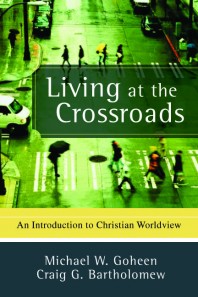The “unbearable tension” of living at the crossroads…

What time is it in our culture? The moderns say it’s a time of great human achievement. Science and technology have ushered in an era of great progress. And they’re right, in many ways. Postmoderns, however, say “the idol of progress has feet of clay.” They assert that there are no such grand stories. There’s no way to even acquire reliable knowledge, since all knowledge is interpretation. A Christian may agree that they are right about the modern idol of progress, but the postmodern view of knowledge is nihilistic—it undermines the possibility of meaning and purpose.
Michael Goheen and Craig Bartholomew devote two chapters in Living at the Crossroads to discussing the development of these two worldviews and the challenges they pose for Christianity.
In … our world’s history the rebellious current of what we have been calling the Enlightenment worldview, or (more briefly) modernity, is in serious difficulty. In postmodernity we see modernity’s decay, as its internal tensions and radical inconsistencies come under ironic attack, especially in Western nations.
Though modernity … and postmodernity (albeit in different ways) claim to be religiously neutral, we have seen that this cannot be so, since both attempt to establish a sustainable culture on the basis of certain beliefs. They assume humankind’s autonomy from God and reject his relational norms for the world. In the place of God they have put human reason, or human language, or material progress, or some other idol—but it is always, and only, an idol.
With the decay of the modern/postmodern culture, how should Christians respond?
If we are to indwell and incarnate the gospel in our own time and place, we must engage in what John Stott has called “double listening”—one ear listening carefully to the Scriptures and the Christian tradition, and the other ear listening to what is going on in the surrounding culture. Only in this way will we be equipped properly to live for Christ. Since a worldview arises out of a story about the world, and stories are concerned with the relationship among events in time, a central question for us is this: “What time is it in our culture?”
Failure to know what time it is in our culture will render us unable to discern the crossroads at which we are called to live for Christ. Such failure may well betray us into accepting, however unintentionally, the idols of contemporary culture. It may also cause us to miss the genuinely good things that contemporary culture has to offer.
An “unbearable tension” arises for Christians who are at the same time members of the body of Christ and members of a modern/postmodern culture.
As those who have embraced the gospel, we are members of a community that believes the Bible to be the true story of the world. But as participating and living members of the cultural community, we are also part of the other story that has been shaping Western culture for a very long time. We cannot simply opt out of the surrounding culture: our lives are woven into its institutions, customs, language, relationships, and social patterns. Our embodying of the kingdom of God must take cultural shape in our own particular time and place. So we find ourselves at the crossroads, where we live as part of two communities, in two stories each largely incompatible with the other, but both of which claim to be true—and claim the whole of our lives.
In the crucible of this “unbearable tension,” Christians frequently resolve the tension in ways that are unfaithful to our calling to be “salt and light.”
· They attempt to withdraw from the “secular” culture altogether into a Christian ghetto, abandoning the West to its idols.
· They accommodate themselves to modern culture, reminding themselves that God loves his world and shutting their eyes firmly to the equal and opposite truth that God does not love the sin that has twisted and thwarted human culture from its foundations upward.
· They adopt a dualism that says we can engage culture in certain areas, but in others we simply fit in. … Although we oppose abortion, public education is considered a neutral area.
Goheen and Bartholomew stress that “we cannot … surrender large chunks of territory claimed by our King.” In seeking a faithful way to resolve the “unbearable tension,” they suggest that valuable lessons can be learned from the experiences of cross-cultural missionaries. The first lesson is that we, who live in the West, are ourselves cross-cultural missionaries.
In Friday’s post, we will look at Goheen and Bartholomew’s suggestions for avoiding these three pitfalls. And we’ll explore what this looks like in the very important area of education—an area that many Christians see as culturally neutral.


 August 29, 2012
August 29, 2012 







Comments are closed.